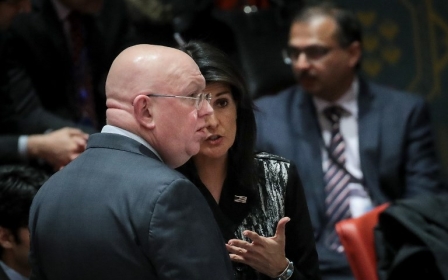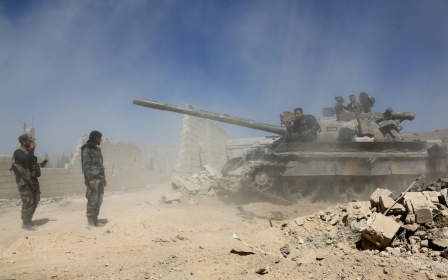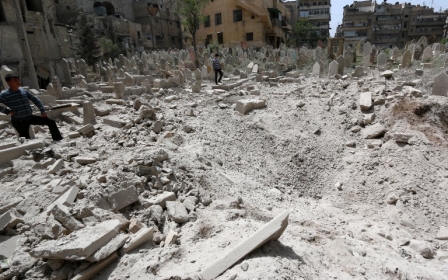Trump vows 'major decision' on Syria after suspected chemical attack
US President Donald Trump condemned a suspected chemical attack on a rebel-held town in Syria and said that he would decide on a response, probably by the end of Monday.
The condemnation comes after Russia described allegations that the Syrian government had gassed its own people in Eastern Ghouta as a "provocation," and said that a suspected Israeli attack on a Syrian air base was a "very dangerous development".
Speaking at a cabinet meeting, Trump said he was talking to military leaders and would decide who was responsible for the attack - whether it was Russia, or Syrian President Bashar al-Assad's government, or Iran, or all of them together.
Trump also said that Russian President Vladimir Putin may bear responsibility for the Syria attack.
International bodies led by the Organisation for the Prohibition of Chemical Weapons (OPCW) were trying to establish exactly what happened on Saturday in Douma, a besieged town in Eastern Ghouta near Damascus.
The Russian military reiterated earlier statements made by Moscow and said that it did not find any traces of a chemical attack, according to the state-run Interfax agency.
"Our military specialists have visited this place... and they did not find any trace of chlorine or any other chemical substance used against civilians," Russia's Foreign Minister, Sergei Lavrov, said on Monday.
Our military specialists did not find any trace of chlorine or any other chemical substance used against civilians
- Sergei Lavrov
Russian UN Ambassador Vassily Nebenzia also said on Monday that Moscow has warned Washington of "grave repercussions" if it carries out an attack against Syrian government forces.
"There was no chemical weapons attack," Nebenzia told the UN Security Council. "Through the relevant channels we already conveyed to the US that armed force under mendacious pretext against Syria – where, at the request of the legitimate government of a country, Russian troops have been deployed - could lead to grave repercussions."
He also said that OPCW investigators should fly to Syria as early as Tuesday to look into accusations about the attack, offering them protection from Syrian authorities and Russian troops.
US government sources said that their initial assessment suggests that a nerve agent was used in the weekend attack, but that further evidence is needed to determine what specific agent was used.
The sources also said the US government had not yet conclusively determined whether the attack was carried out by Syrian government forces.
The internationally funded Union of Medical Care Organisations said on Monday that 60 people had died and 1,000 were injured in the attack, and the OPCW said it was gathering information for its own investigation.
Russia's Lavrov blamed Israel for an air attack on Sunday on the T4 airbase in central Syria, and used it to warn western powers that further action against the Syrian government would be a "dangerous development".
"I hope at least that the US military and those of the countries participating in the coalition led by the United States understand that," he said.
International condemnation
The Russian foreign minister's statements came amid a condemnation by Western powers of the Syrian government and its principal backer, Moscow.
US Defence Secretary Jim Mattis said on Monday he would not rule out "anything" in response to the incident.
"The first thing we have to look at is why are chemical weapons still being used at all when Russia was the framework guarantor of removing all the chemical weapons. And so, working with our allies and our partners from NATO to Qatar and elsewhere, we are going to address this issue," Mattis said before the start of a meeting with Qatar's emir.
Mattis had been asked if the US was capable of striking the Syrian government's chemical weapons facilities.
When asked if he could rule out taking actions, like launching air strikes against government forces, Mattis said: "I don’t rule out anything right now."
On Sunday, British Prime Minister Theresa May said the attack was a "barbaric targeting of innocent civilians" and that the UK government was "urgently establishing what happened".
Russia, a permanent member of the security council, has vetoed all attempts to condemn the Syrian government and its president, Bashar al-Assad, through the United Nations.
US Ambassador to the UN Nikki Haley said on Monday that Washington "will respond" to the alleged chemical attack even if the Security Council does not reach a resolution on the matter.
"History will record this as the moment when the Security Council either discharged its duty or demonstrated its utter and complete failure to protect the people of Syria," she said. "Either way, the United States will respond."
Russian officials argue that Syria controls no chemical weapons due to a Moscow-negotiated deal to remove them in 2014, after sarin attacks on Ghouta in August 2013 killed more than 1,000 people.
The US and allies directly blamed the Syrian government for those attacks.
T4 airbase attack
The Syrian military meanwhile said the T4 airbase attack was an act of "Israeli aggression".
The Russian defence ministry repeated the Syrian claims: "Two F-15 planes of the Israeli army hit the airbase between 3.25am and 3.53am Moscow time with the help of eight missiles controlled remotely from Lebanese territory, without entering Syrian airspace," it said.
Russia said five of the missiles were destroyed by Syrian defence systems but the remaining three struck the western part of the airbase.
At least 14 fighters, including Iranians, were killed in the strike, according to the monitoring organisation the Syrian Observatory for Human Rights. Iran confirmed three of its soldiers were killed.
The Lebanese military said in a statement that there had been several breaches of its airspace by Israeli jets overnight.
Forces from government allies Russia and Iran, as well as fighters from the Lebanese Hezbollah militia, are known to have a presence at the base, according to the observatory.
No Russian specialists present in Syria were injured in the attack, Moscow's defence ministry said.
A military spokeswoman for Israel, which has struck Syrian military positions several times in recent years, declined to comment.
A Pentagon spokesman denied the US was involved in the attack on T4, saying it was not conducting strikes in Syria "at this time".
US forces a year ago fired a volley of cruise missiles at the government's Shayrat air base in retaliation for another chemical attack in April of last year in Khan Sheikhoun. The Shayrat airport lies just 70km west of T4.
New MEE newsletter: Jerusalem Dispatch
Sign up to get the latest insights and analysis on Israel-Palestine, alongside Turkey Unpacked and other MEE newsletters
Middle East Eye delivers independent and unrivalled coverage and analysis of the Middle East, North Africa and beyond. To learn more about republishing this content and the associated fees, please fill out this form. More about MEE can be found here.




